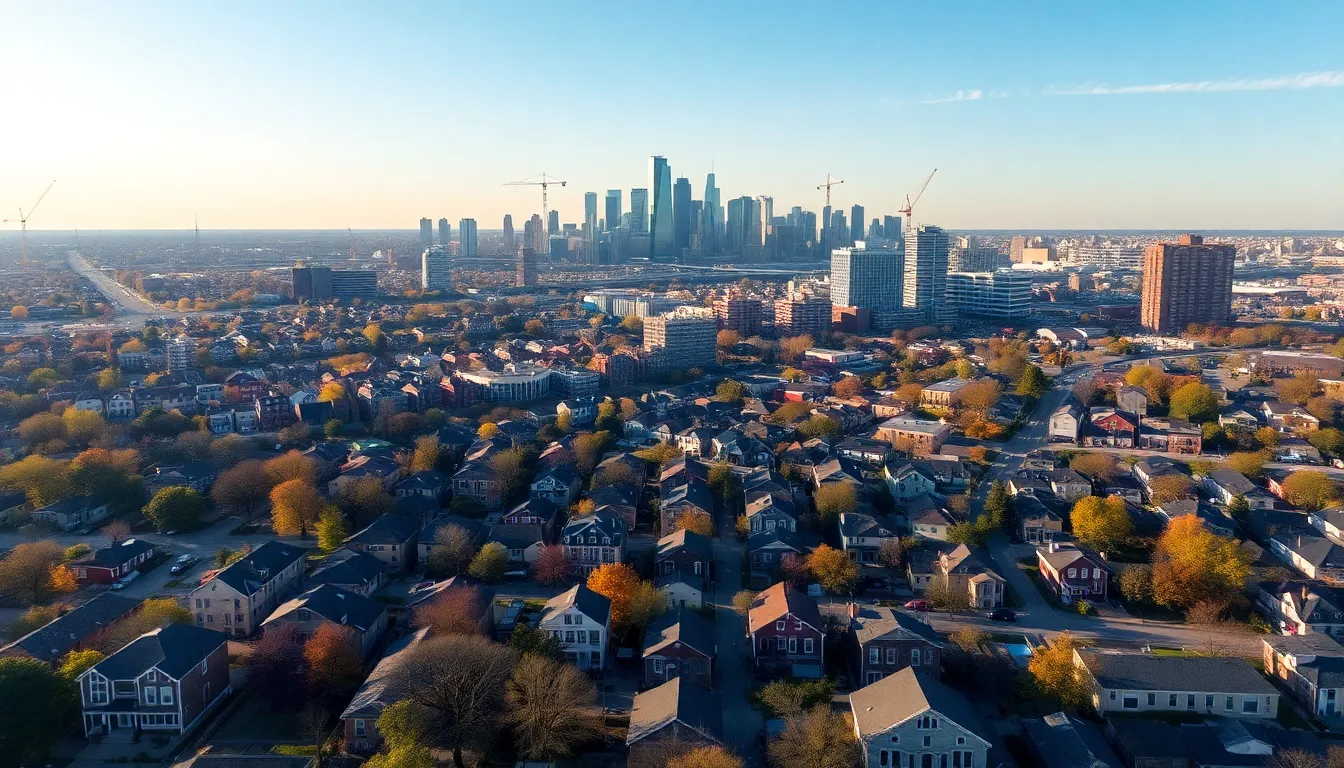Detroit real estate investing is like finding a hidden gem in a thrift store—sometimes it takes a little digging, but the rewards can be fantastic. With its rich history and vibrant culture, the Motor City is revving up for a real estate renaissance. Investors are flocking to this once-forgotten landscape, eager to cash in on affordable properties and a promising market.
Table of Contents
ToggleOverview of Detroit Real Estate Investing
Detroit real estate investing presents unique opportunities for savvy investors. The city’s economic revitalization contributes to a positive atmosphere for property investment. Rising demand for rentals and homeownership attracts attention.
Numerous neighborhoods offer affordable property options, making it easier for investors to enter the market. Data indicates that Detroit’s median home price stands at approximately $60,000, significantly lower than the national average.
Many investors find potential in the city’s rental market, with rental rates averaging $1,200 per month. Increasing job opportunities in sectors like technology, healthcare, and automotive support housing demand.
Investing in Detroit poses lower risks compared to other metropolitan areas. Many properties are available below market value, allowing investors to acquire assets at competitive prices. A diverse population with a growing demand for housing enhances investment prospects.
Furthermore, the local government promotes development initiatives, aiming to revitalize neighborhoods. Successful acquisitions often lead to appreciation in property values, benefiting long-term investors.
Evaluating the market allows investors to identify trends and emerging areas of growth. Networking with local realtors and attending property auctions can provide deeper insights into profitable investments. Many investors benefit from understanding local zoning laws and property regulations, which can affect investments significantly.
Overall, Detroit stands as a noteworthy option for real estate investing, presenting diverse opportunities for those looking to grow their portfolios.
Market Trends and Analysis

Detroit’s real estate market showcases various compelling trends that attract investors. Understanding current property values and identifying predicted growth areas significantly enhance investment strategies.
Current Property Values
Property values in Detroit currently average around $60,000, presenting a stark contrast to the national average. Investors often find properties below their market value, creating opportunities for profitable acquisitions. Moreover, neighborhoods like Midtown and Corktown experience rising interest, with home prices trending higher due to development initiatives. Many investors capitalize on the affordable price point, helping them maximize rental yield. Rental rates hover near $1,200 per month, driven by increasing demand from professionals seeking housing close to employment hubs.
Predicted Growth Areas
Predicted growth areas in Detroit include neighborhoods such as East Jefferson and Westside. Economic revitalization initiatives focus on these regions, signaling potential appreciation in property values. Job growth in sectors like technology and healthcare plays a crucial role, attracting more residents to these areas. Investors should pay close attention to the urban development projects underway, as they often lead to enhanced infrastructure. Market analysts highlight the impact of new businesses establishing operations in these neighborhoods, which creates further demand for housing and rental properties. As these trends develop, the prospects for profitable investments increase significantly.
Opportunities in Detroit Real Estate
Detroit’s real estate market presents numerous investment opportunities, driven by the city’s ongoing economic revitalization and demand for housing.
Single-Family Homes
Single-family homes in Detroit represent an attractive option for investors. Properties average around $60,000, providing affordability that appeals to first-time buyers and investors alike. The city’s diverse neighborhoods, such as Midtown and Corktown, offer potential for appreciation as demand increases. Recent job growth, particularly in technology and healthcare, bolsters interest in residential properties. Investors can benefit from a rental market where average rates stand at $1,200 per month. This combination of low acquisition costs and rising rental incomes enhances the investment potential for single-family homes.
Multi-Family Units
Multi-family units also capture investor attention in Detroit. The demand for rentals fuels the growth of these properties, especially in revitalized neighborhoods. Investors can leverage favorable market conditions, with many buildings available below market value. Average rental income in these units remains competitive. With increasing job opportunities leading to population growth, interest in multi-family housing strengthens. Targeting regions like East Jefferson and Westside, which show promise for appreciation, proves advantageous for strategic investors. Recognizing the impact of urban development projects further enhances the appeal of multi-family investments.
Challenges of Investing in Detroit
Investing in Detroit presents several challenges that investors must navigate. Market fluctuations and economic factors can significantly affect the real estate landscape.
Economic Factors
Economic instability poses a challenge for potential investors. Job growth in Detroit’s technology, healthcare, and automotive sectors fluctuates, impacting demand for housing. Investors should remain vigilant about shifts in local industries. Additionally, property values may not consistently appreciate, creating uncertainty in investment returns. Economic disparities in different neighborhoods can also affect profitability. Neighborhoods with revitalization efforts often show promise while others lag behind. Understanding these economic dynamics is essential for making informed investment decisions.
Legal Regulations
Legal regulations complicate the investment process in Detroit. Local laws concerning property ownership, landlord-tenant relationships, and zoning can vary significantly. Investors must adhere to these regulations to avoid potential legal issues. Knowledge of the city’s tax incentives and property regulations can benefit real estate investors. Compliance with municipal codes and state laws is critical for successful investments. Additionally, there’s a need to monitor changes in regulations as local governments implement new policies. Staying informed can help mitigate risks associated with legal compliance in Detroit’s evolving market.
Tips for Successful Investing
Investors seeking success in Detroit’s real estate market should focus on specific strategies. Understanding local dynamics plays a crucial role in the investment journey.
Finding the Right Property
Identifying properties in high-demand areas is essential for maximizing returns. Look for single-family homes around $60,000 in attractive neighborhoods like Midtown and Corktown. Research on market conditions and local amenities can directly impact property value. Investors should also consider the potential for rental income, particularly in competitive markets where average rates hover around $1,200 per month. Engaging a local real estate agent provides valuable insights into emerging trends. Utilizing online platforms and real estate apps enhances the property search experience.
Financing Options
Various financing options are available for Detroit real estate investors. Traditional mortgages provide stability but may require higher credit scores. For investors, hard money loans offer quick access to capital, typically suited for short-term projects. Options like FHA loans enable investments with lower down payments. Additionally, sellers may offer financing, creating unique opportunities for negotiation. Evaluating each financing method helps investors align strategies with their financial goals. Exploring local grants and incentives can further enhance investment potential. Being informed about the financing landscape improves decision-making capabilities.
Detroit’s real estate market stands out as a promising landscape for savvy investors. With its affordable property prices and revitalized neighborhoods, the city offers unique opportunities for those looking to grow their portfolios. The demand for rentals continues to rise, driven by job growth and urban development, making it an attractive option for both new and seasoned investors.
While challenges exist, understanding local dynamics and staying informed about regulations can mitigate risks. By targeting high-demand areas and leveraging various financing options, investors can maximize their returns in this evolving market. Detroit’s potential for appreciation and growth makes it a noteworthy choice for anyone interested in real estate investing.



